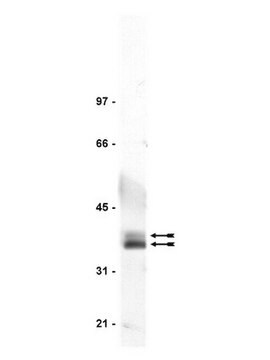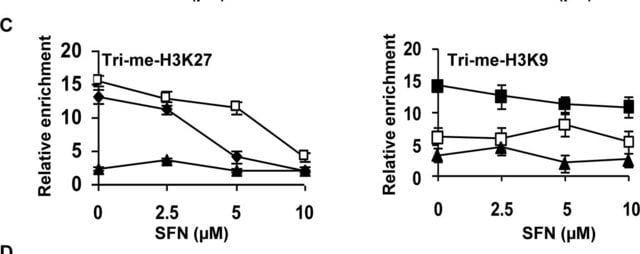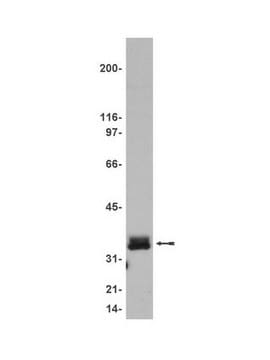推荐产品
生物源
mouse
品質等級
抗體表格
purified immunoglobulin
抗體產品種類
primary antibodies
無性繁殖
A16/17, monoclonal
物種活性
mouse, human, rat
製造商/商標名
Upstate®
技術
immunoprecipitation (IP): suitable
western blot: suitable
同型
IgG1κ
NCBI登錄號
UniProt登錄號
運輸包裝
dry ice
目標翻譯後修改
unmodified
基因資訊
mouse ... Grk4(14772)
特異性
GRK 4, GRK 5 and GRK 6
免疫原
GST fusion protein corresponding to residues 463-590 of bovine GRK 5
應用
Anti-GRK 4-6 Antibody, clone A16/17 detects level of GRK 4-6 & has been published & validated for use in IP & WB.
Research Category
Signaling
Signaling
Research Sub Category
GPCR, cAMP/cGMP & Calcium Signaling
GPCR, cAMP/cGMP & Calcium Signaling
品質
routinely evaluated by immunoblot on murine 3T3/A31 RIPA lysate or human K562 cells
標靶描述
65-70kDa
外觀
Ammonium Sulfate Precipitation
0.1M Tris-glycine, pH 7.4, 0.15 NaCl with 0.05% sodium azide
Format: Purified
儲存和穩定性
2 years at -20°C
分析報告
Control
Positive Antigen Control: Catalog #12-305, 3T3/A31 lysate. Add 2.5 μL of 2-mercapto-ethanol/100 μL of lysate and boil for 5 minutes to reduce the preparation. Load 20 μg of reduced lysate per lane for minigels.
Positive Antigen Control: Catalog #12-305, 3T3/A31 lysate. Add 2.5 μL of 2-mercapto-ethanol/100 μL of lysate and boil for 5 minutes to reduce the preparation. Load 20 μg of reduced lysate per lane for minigels.
法律資訊
UPSTATE is a registered trademark of Merck KGaA, Darmstadt, Germany
免責聲明
Unless otherwise stated in our catalog or other company documentation accompanying the product(s), our products are intended for research use only and are not to be used for any other purpose, which includes but is not limited to, unauthorized commercial uses, in vitro diagnostic uses, ex vivo or in vivo therapeutic uses or any type of consumption or application to humans or animals.
未找到合适的产品?
试试我们的产品选型工具.
儲存類別代碼
12 - Non Combustible Liquids
水污染物質分類(WGK)
WGK 1
閃點(°F)
Not applicable
閃點(°C)
Not applicable
E R Bychkov et al.
Neurobiology of aging, 29(3), 379-396 (2006-11-28)
Arrestins and G proteins-coupled receptor kinases (GRKs) regulate signaling and trafficking of G protein-coupled receptors. We investigated changes in the expression of arrestins and GRKs in the striatum of patients with Parkinson's disease without (PD) or with dementia (PDD) at
Sudipto Das et al.
Pflugers Archiv : European journal of physiology, 464(1), 101-109 (2012-04-25)
Mitochondrial structure and function are central to cell physiology and are mutually interdependent. Mitochondria represent a primary target of the alcohol-induced tissue injury, particularly in the liver, where the metabolic effects of ethanol are predominant. However, the effect of ethanol
Jenna L Aumiller et al.
The Journal of biological chemistry, 299(2), 102880-102880 (2023-01-11)
Heterotrimeric G protein stimulation via G protein-coupled receptors promotes downstream proliferative signaling. Mutations can occur in Gα proteins which prevent GTP hydrolysis; this allows the G proteins to signal independently of G protein-coupled receptors and can result in various cancers
Rachel M DeRita et al.
Journal of cellular biochemistry, 118(1), 66-73 (2016-05-28)
It is well known that Src tyrosine kinase, insulin-like growth factor 1 receptor (IGF-IR), and focal adhesion kinase (FAK) play important roles in prostate cancer (PrCa) development and progression. Src, which signals through FAK in response to integrin activation, has
Phosphatidylinositol 4,5-bisphosphate (PIP2)-enhanced G protein-coupled receptor kinase (GRK) activity. Location, structure, and regulation of the PIP2 binding site distinguishes the GRK subfamilies.
Pitcher, J A, et al.
The Journal of Biological Chemistry, 271, 24907-24913 (1996)
我们的科学家团队拥有各种研究领域经验,包括生命科学、材料科学、化学合成、色谱、分析及许多其他领域.
联系技术服务部门








